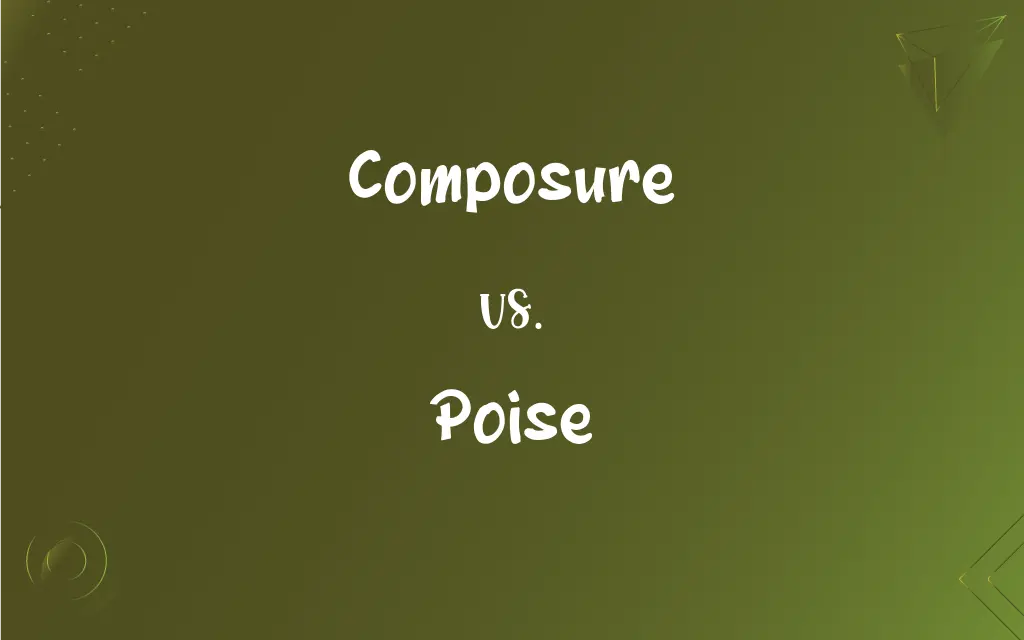Composure vs. Poise: What's the Difference?
Edited by Aimie Carlson || By Harlon Moss || Published on December 12, 2023
Composure refers to a state of calmness and self-control, while poise is a composed, dignified, and self-assured manner.

Key Differences
Composure is the mental calmness and evenness of temper, especially in a difficult situation. Poise, while similarly related to calmness, more specifically denotes grace and confidence in bearing and attitude. Composure is internal, reflecting emotional control, whereas poise is often external, observable in one's conduct and appearance.
In moments of stress, composure is maintaining one's cool and not letting emotions overtake rational thought. Poise, on the other hand, extends beyond mere control of emotions to encompass a composed and self-assured way of handling situations. Where composure is about inner peace, poise is about outward elegance under pressure.
Composure often relates to the psychological aspect of dealing with challenges calmly. Poise, however, implies a physical and social aspect, demonstrating grace and control in social interactions or physical movements. Composure is about self-management, whereas poise involves managing how others perceive us.
A person's composure is tested in situations of pressure or emotional turmoil. Poise, conversely, is observed in the grace with which one carries themselves during these situations. Composure is about steadiness of mind, while poise is about steadiness of presence.
Composure is a quality that prevents panic or rash actions, focusing on internal control. Poise, in contrast, is more about the external manifestation of this control, presenting a serene and confident demeanor to the world.
ADVERTISEMENT
Comparison Chart
Primary Focus
Emotional and mental stability
Graceful and confident demeanor
Manifestation
Internal, psychological
External, observable
Key in Situations
Stressful, challenging
Social interactions, physical poise
Underlying Quality
Self-control, calmness
Dignity, elegance
Relationship with Emotions
Managing personal emotions
Displaying controlled emotions
ADVERTISEMENT
Composure and Poise Definitions
Composure
Steadiness of mind under pressure.
His composure during the emergency was admirable.
Poise
Self-assuredness in demeanor and conduct.
Despite being a newcomer, she showed great poise in handling the questions.
Composure
Calmness and self-control under stress.
Despite the chaos, she maintained her composure and made rational decisions.
Poise
Dignified, self-confident manner under scrutiny.
Under the media's scrutiny, she maintained her poise.
Composure
Emotional self-regulation in difficult situations.
She showed remarkable composure when delivering the bad news.
Poise
Graceful and elegant bearing in a person.
She walked with poise, exuding confidence.
Composure
Poised reaction to unexpected challenges.
He kept his composure when the interview questions became tough.
Poise
Balanced and steady physical or mental bearing.
The dancer's poise was evident in her every movement.
Composure
A tranquil state of mind, especially as a characteristic quality.
Her natural composure helps her excel in high-pressure jobs.
Poise
Assured and composed manner.
His poise during the presentation won everyone's admiration.
Composure
A calm or tranquil state of mind; self-possession.
Poise
To carry or hold in equilibrium; balance
I poised the pencil on the edge of the table.
Composure
Calmness of mind or temperament
Poise
To cause to be ready or about to do something
She is poised to win the nomination.
FAQs
Does poise only refer to physical grace?
Poise includes physical grace, but also encompasses a confident and composed manner.
Can someone be composed but not poised?
Yes, one can have internal composure (emotional control) without necessarily displaying poised behavior.
Is composure an innate trait or can it be developed?
Composure can be developed and enhanced through practice and mindfulness.
Does age affect one's poise?
Age can enhance poise as individuals gain experience and confidence over time.
Can poise be misinterpreted?
Poise can sometimes be misinterpreted as aloofness or arrogance, especially if overemphasized.
How does composure affect decision-making?
Composure allows for clear-headed and rational decision-making, especially under stress.
Is poise important in professional settings?
Poise is valuable in professional settings as it conveys confidence and grace under pressure.
Are there exercises to improve composure?
Mindfulness, meditation, and stress management techniques can improve composure.
Is composure the same as apathy?
No, composure is about control and balance of emotions, not lack of emotion.
How do cultural differences impact the perception of poise?
Cultural norms and values can influence how poise is perceived and valued.
Is poise related to confidence?
Poise is closely related to confidence, as it reflects self-assurance and grace.
How does body language relate to poise?
Body language is a key component of poise, conveying confidence and grace through physical demeanor.
Is composure always beneficial?
While generally beneficial, excessive composure can sometimes mask important emotional responses.
Can poise be taught?
Yes, poise can be cultivated through practice, awareness, and learning from role models.
Can composure be a leadership quality?
Composure is a valuable leadership quality, as it inspires confidence and calm in others.
Can composure impact personal relationships?
Composure can positively impact personal relationships by fostering calm and rational communication.
Can you lose composure momentarily?
Yes, composure can be disrupted by intense emotions or unexpected events, but can be regained.
How does stress impact composure?
High stress can challenge composure, but effective coping mechanisms can mitigate this.
Does attire influence one's poise?
Attire can affect poise, as it influences self-perception and how others perceive us.
Is poise only important in public settings?
While often associated with public settings, poise is also beneficial in personal and intimate settings.
About Author
Written by
Harlon MossHarlon is a seasoned quality moderator and accomplished content writer for Difference Wiki. An alumnus of the prestigious University of California, he earned his degree in Computer Science. Leveraging his academic background, Harlon brings a meticulous and informed perspective to his work, ensuring content accuracy and excellence.
Edited by
Aimie CarlsonAimie Carlson, holding a master's degree in English literature, is a fervent English language enthusiast. She lends her writing talents to Difference Wiki, a prominent website that specializes in comparisons, offering readers insightful analyses that both captivate and inform.







































































